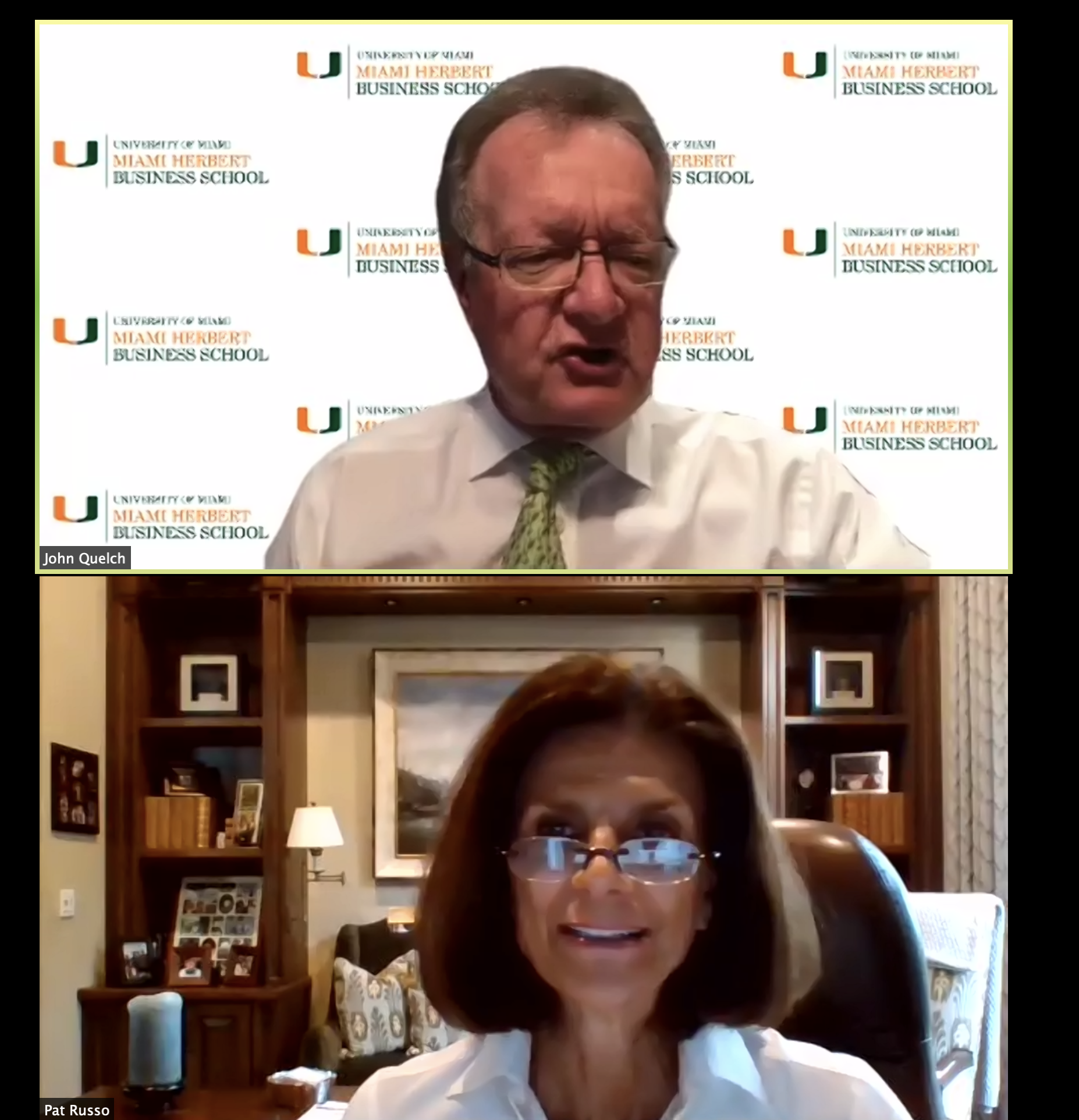Over the past few decades, Pat Russo has helped several telecommunications giants recover from some of the worst disasters imaginable—the dot.com burst, the communications crash, 9/11 attacks, the Great Recession—and regain their financial footing.
While the current pandemic dwarfs all the above in terms of its impact on the global economic landscape, Russo shared in an hour-long virtual talk—hosted by the University of Miami Patti and Allan Herbert Business School—that those travails shaped and reinforced her conviction that effective leaders embrace a strategy that addresses short-term survival while scanning the longer-term horizon for opportunities.
“It’s the notion of playing both defenses—really making sure you’re doing everything you can to navigate to get to the other end—and offense, where companies are doing everything possible to look ahead and see what’s going to be different when they get through and what potential new opportunities will exist,” Russo said.
Experience with managing a crisis is critical, along with a cadre of qualities that effective leaders embody, she said.

“When things get tough, it’s important to be fact-based and objective in communications, to be decisive—you can’t dither around about everything that ‘isn’t’, and you have to have empathy for the people you lead and that element has to come through,” Russo stated.
Especially in a wartime or crisis situation, a leader must be a good and honest communicator, she added. “Because the leader of an organization is the one who everyone looks to, to see what they’re saying—are they confident, are they dealing with reality?—it’s important to strike the balance between telling the ugly truth with the optimism about how you’re going to get through it,” she explained.
Russo’s recommendations for phased action and attention, and the need for leaders to exhibit certain qualities, paralleled those identified by Dean John A. Quelch in his recent video “The Seven C’s of Leadership During the Coronavirus Crisis.”
For Linda Neider, professor and chair of the Department of Management, many of these qualities are timeless and date back to ancient Greek philosophy and especially Plato, Socrates’ student, as well as other ancient cultures.
“Integrity, resilience, intellectual curiosity, an openness to the ideas and opinions of others—the knowledge that you do not have all the answers and need to continually seek information—expressed even back then,” Neider said.
“Perhaps, most importantly, some of the greatest leaders through time have offered hope—hope that there will be a better future,” she added.
Quelch, Neider, and Russo all agreed that because of the urgent and fluid situation of a crisis, leaders will naturally make mistakes.
“When you do, you have to be appropriately transparent,” Russo said. “If you’re trying to create a culture of taking risks you have to have some failures. So, pick yourself up, say ‘what did I learn from this,’ and move on.”
Russo was named CEO of Lucent Technologies, a spin-out of AT&T, in January 2002 at a time when the tech systems and equipment global giant was riding the crest of the internet boom.
Then the dot.com bubble burst. The industry crash resulted in a value loss of $1.3 trillion. “It was shell-shock. Revenue was falling like a knife. Half of our customers went bankrupt; we were burning over $1 billion of cash a quarter. We employed 70,000 people, and many thought bankruptcy was our only way out. We had an incredible challenge on our hands,” Russo recounted.
Bolstered by a strong board that “didn’t panic,” Russo guided the company to focus on what it could control. “It was a scary, challenging time, especially for someone who was new at running a public company,” she said, noting that it took several years to reestablish the company and five years to reach the point to accomplish a cross-border merger.
More than three hundred viewers, including internationally located alumni, attended Russo’s interactive lecture moderated by Quelch. Among the questions asked included one seeking recommendations for students who will be graduating into the gloomy job landscape.
“The economy will rebound, and there will be jobs,” Russo said. “It’s going to be tough, but you’ve got to compete. So, expand your horizons. Expand your thinking. Expand your flexibility. And, figure out what you need to do, how you need to show up, and how creative you need to be. Hang in there, there will be jobs, but it’s going to take a while.”
The next edition of Miami Herbert's Virtual Distinguished Leaders Lecture Series will welcome the Honorable Dr. David J. Shulkin, the ninth Secretary of the US Department of Veterans Affairs, on Thursday, April 30 at 6 pm. For registration and more information, click here.
Miami Herbert Business School’s Virtual Distinguished Leaders Lecture Series is made possible through the generosity of Southern Glazer’s Wine & Spirits.

